Our BSc (Hons) Sport and Exercise Science students who have taken the 3rd year choice module, Expedition Physiology, have been visiting the Welsh Mountains before the Easter holidays for 20 years now. Visiting Bannau Brycheiniog (pronounced ban-aye bruch-ay-nee-og and meaning the peaks of Brychan’s kingdom, formerly Brecon Beacons) has formed an integral element to the module, enabling our students to put into practice and be assessed on their navigation, leadership and expedition nutrition skills. Broader than that, enabling our students to Learn Through Adventure to complement the scientific and more theoretical content has allowed this module to maintain its currency with our students and offer a unique experience during their time at the University of Brighton.

Dr Neil Maxwell was the brainchild for module, with the first cohort starting back in 2003/04 and which evolved from several sleep deprivation studies Neil used to run. The Expedition Physiology module has always been front-loaded with a strong scientific underpinning, where students learn about survival in the heat, cold and altitude, complemented by laboratory practicals in each of these environmental extremes. The cold injury lab practical was specially designed to mimic conditions often experienced in the Welsh Mountains in the Spring, so the students understood about the signs and symptoms of accidental hypothermia and then knew how to treat it ‘on the hill’. On more than one occasion those skills and competencies were needed as we had to deal with some mild cases of accidental hypothermia. Students have also been exposed to themes around expedition nutrition, sleep deprivation and expedition planning before they moved towards the second half of the module that was entirely practical and considered basic and advanced navigation techniques. Although technology is everywhere in our lives, we have always prefered to get back to basics and teach the students to navigate with a map, compass, the lay of the land and even with a bit of help from the sun and the stars. Like first aid, we see it as an essential life skill.

This year saw a smaller group of students than normal embrace the Welsh ‘Black Mountain’ experience, but while small in number they were definitely large in spirit. Even if the characteristic Welsh weather did not disappoint, this did not dampen the spirit and energy of the students or the leaders (Mark Hayes, Bill Norton and Neil Maxwell). There was the usual anticipation as we arrived at Llandessant Youth Hostel and the students worked out where everything was, who was in the top bunks and tried not to be preturbed by being right beside a graveyard…even if there was a great view of where we would be heading the next day! Of course they had to get through the night first and it would seem we had some snorers amongst us that rekindled the sleep deprivation element from which this module evolved!!


The next day, once a hearty breakfast was consumed, the number of layers and waterprooofs were decided and the students were given their first destination, we were all off in jovial form. Of course for both groups, this started by heading in the wrong direction, but it did not take long to recalibrate (or turn the map round!) and settle into it. I believe one student was quite partial to asking if any water source, even puddles, could be used as handrails. The usual river crossings brought much hillarity though, as did the risk of falling over…which seemed to be a right of passage! I will not name names, but as students buddied up to cross the rivers, some were more like a pair of Bambi deer together. It was good to witness some of the more advanced navigation techniques (handrailing, attack points, aiming off and tick and overshoot features) being used by the students, where they recognised that navigation is about constantly using the information around them. Of course we got lost in the hills sometimes, but that has to be expected and that was not just by the students. To say some of the students ‘found themselves’ would not be straying from the truth. Over the years as the students have cooked out on the hill to showcase their expedition nutrition skills, the menus have felt more like they deserve a Michelon Star. This year did not disappoint, even if some quick scooping up of half-cooked meat with some grass in amongst it was needed after the stove fell over. Gone are the days of pot noodles and a block of cheese! Learning the hard way that not all matches are waterproof was a life lesson. Being so wet, boots were often submerged in bogs, but fortunately no Trench foot. The steep ascents definitely provoked some rapid increases in heart rate and adrenaline when they looked down where they had come from. There is no question the students should feel proud of surviving this year’s expedition as the weather at times was horrendous…50 mph winds and horizontal rain. We took shelter when we could (including in our red Bothy bags), but the stories being shared and the banter certainly kept us all going. Drying our clothes and boots ahead of the 2nd day was a challenge as we fought for whatever radiator space we could find. We finished our last night in the Llandeussant Youth Hostel by regailing our adventures and misadventures of this year’s expedition, competing over the strawberry lace challenge eating contest (the girls were definitely the best!) and the students undergoing an obligatory, but unoffical graduation checklist. Below are a few photos of our memories from what was a great expedition…well done students of 2023!
Neil has not been able to deliver this module alone and over the years many staff have helped him. Dr Mark Hayes and Dr Alan Richardson have been integral to the success of the module, with Alan having led the module for a good stint himself. We have been helped by 15 different staff members from the university and the then Sussex Downs College (Alan Allchorn, Sue Cheshire, Raul San Emeterio, Paul Castle, Richard Mackenzie, Flo Pietzsch, Emma Ross, Nick Smeeton, Craig Wakefield, Bill Norton, Rebecca Relf, Simon Green, Jessica Mee, Rosie Twomey, Matt Debney) who have joined the Bannau Brycheiniog Student Expedition. As you would expect when taking a group of students, who I might add are always a little twitchy with it being generally 6 weeks before they submit their dissertations, we have had some entertaining times with some great memories. The sample of photos from over the years hopefully captures a few of these. The videos in a previous blog – Student Expedition News: 16 Years and Going Strong! – should offer some additional entertainment.
We have also benefitted from some stunning scenery and surprisingly, good weather too!
As the lecturers and their joints have aged, it is difficult to know what the future of this module will be in its current guise. Walking ~40 k over the unforgiving and often very wet Welsh valleys and steep mountain slopes definitely takes its toll. I am glad to say we no longer hike in with all our gear and camp as we used to. One year walking in as the SAS were walking out saying the weather was too bad was a little unnerving! Thanks must go to the Sportswise Sports Medicine Clinic who are housed beside us in the Welkin Sport and Exercise Science Laboratories, and who have definitely patched the leaders up pre and post expedition on many an occasion. However, we have to look back over the last 20 years with great pride at what we have accomplished. Between 500 and 600 students will have benefitted from this module and had their student experience enriched while here at the University of Brighton. The original premiss of the module was that a little bit of science combined with practical skills will make expeditions enjoyable, successful and above all, safer. We hope that for many of the students it has inspired them to head out into the hills with a skillset that gives them more confidence of how to prepare and cope in hazardous environments. I know some students have actually translated their expedition research proposal (assessment 1) into reality and gone off and completed it…the Jungle Marathon no less! For a few students, it may well of discouraged them to rush out into the hills again…which maybe is not a bad thing either. I think the photo below from this year’s expedition of Mark Hayes leading the students towards the double rainbow it quite fitting as we think of the pot of gold we have been lucky enough to experience for 20 years!
Thank you to all the staff and students who have made it possible.








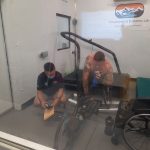


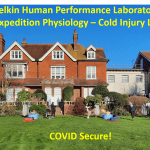








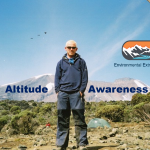
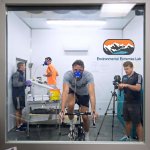

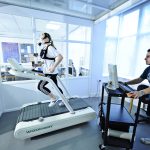






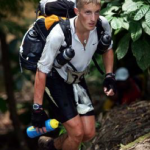


Leave a Reply